Marketing
Working in dynamic sectors can be challenging. All industries have different pressure points – deadlines, workloads and targets can lead to stress, burnout and in some cases – various mental health issues. A study, commissioned by Mental Health Foundation, found that only 13% of people report living with high levels of good mental health. It’s important we pay attention not only to our personal mental health, but also that of our co-workers.
As we mentioned before on RocketMill’s blog as well as social media (Twitter, Instagram), between 8th and 15th of May we decided to participate in Mental Health Awareness Week and take a few steps towards stronger mental health in our own office.
Mental health is an incredibly diverse and complicated subject, so to make an impact we had to focus on a few key things. Helpfully, Mental Health Awareness Week always has a theme and this year it was “Surviving or Thriving?”. One of the proposed goals was to spread better understanding of mental health and build community resilience, which was one of our main focuses for our week. It has also been heavily influenced by Sarah Rudder’s talk from Thales Learning & Development.
Before I share the activities we tried, let me just say that we already had a lot of great initiatives in our office to help with our mental health and wellbeing:
-
- Personal coach to talk about whatever we want to talk about confidentially
-
- Professional neck and back massages in the office once a quarter
-
- Lunch and Learns – where we can learn new skills from our colleagues
-
- Gym membership or Private Health Care
- See the full list on our careers page
All of these things can often be taken for granted, however they already laid great foundations for stronger mental health by promoting communication between teams, getting to know (and trust) each other in non-work environment and encouraging the culture of work hard and play hard.
Our approach for this week was to build upon the foundations that we already had and help people manage their stress, improve physical health, but most of all change the perception of taking care of our mental health. Let me explain…
Ultimately we aim to produce results for our clients, and do work we can be proud of. For that we need significant effort, patience and creativity. However, we often take counterproductive routes to achieve that. Many think that longer hours and more elbow grease are the best ways to go, meaning that taking time off and relaxing can be viewed as wasteful activities – however it’s actually the opposite. Taking breaks makes us more creative, because when we let our brains wander, they start making connections they weren’t making before. Not only that, taking breaks helps to reduce stress, which is one of the main causes of poor mental health at work.
So, with all that in mind, we’ve designed different activities and challenges. Here’s how our culture changed for a week:
We halved our coffee consumption
That’s a rough guestimate by our office manager, however we did notice a significant drop in our need to be caffeinated. How? We gave everyone a water bottle and set up a board to track how much water we’ve been drinking. We stayed away from making it a competition and focused on a combined effort instead.
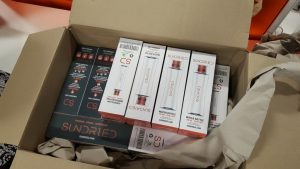
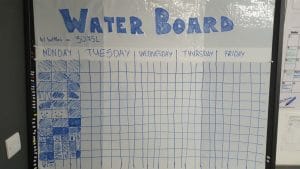
To help increase water consumption, we also introduced a “Pimp My Water” station, which had a selection of fruits to add flavour to the water. On it’s own water might be a bit bland for someone who’s used to oh-so-tasty coffee and soda.
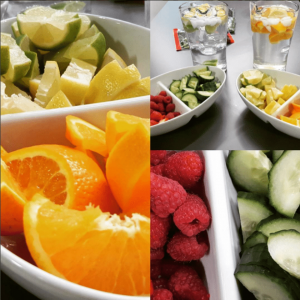
In the questionnaire we sent out after the Mental Health Awareness Week, 94% of respondents said they will continue to drink more water, and the feedback about benefits of drinking more water was very positive:
“Increased my energy levels and reduced my dependence on caffeine”
“The water drinking drastically improved my alertness and productivity, and i drank less coffee!”
Collectively we took over a million steps
1,051,201 to be exact. That’s about 841 km (522.6 miles). We attempted to collectively walk from Land’s End to John O’Groats, which is 811 miles if you trust Google Maps. Apparently, walking the famous distance is a lot harder than it looks, but it was a great way to encourage everyone to move a little bit more. Also, we can now sing “500 miles” by The Proclaimers with genuine conviction.
One of the ways to encourage people to move more was having a daily 9am walk with the entire office. People loved a chance to chat to someone they don’t normally work with, which in turn resulted in elevated mood, and the fresh air helped everyone to concentrate afterward.
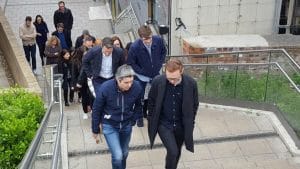
We became more productive and relaxed
One of the key quotes from the feedback form was:
“Felt happier and more relaxed, even though it was a very busy and difficult week.”
This was achieved through combination of factors – drinking less coffee, walking more, and re-energising stretches twice a day. Stretching had another great benefit, apart from helping to reduce stress in muscles – it quickly turned into a fun social activity, which improved our mood.
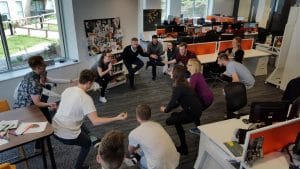
We’ve tried new things
We all have our own preferences and tastes, things we like and things we don’t like. So one of the key goals for Mental Health Awareness Week was to set up a variety of options to explore.
So we tried things like:
- Guided mindfulness meditation in silence run by Ian Flynn, our Head of Creative Solutions
- Trying new flavour recipes for our water, where our Senior Content Strategist Rowena Heal shared her tips on flavouring water
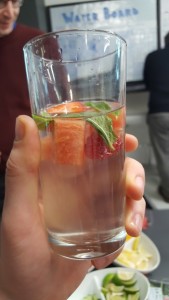
- Colouring a picture of a dragon as a way to meditate and take mind off work
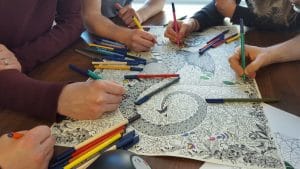
-
- Getting people to know each other by splitting them into small groups, giving them new tea to try and a list of questions that could provoke funny and unusual conversations that under normal circumstances we would not have (questions like “what is your spirit animal” or “what’s left on your bucket list?”).
- Eating our Friday breakfast together instead of each on their own
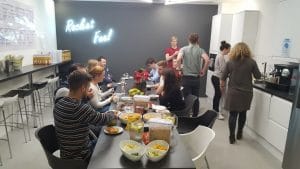
Again, these activities had a lot of positive feedback:
“It was great for raising awareness. I’ve flirted with the idea of giving meditation and mindfulness a go for a while so think that’s certainly an area I’ll be exploring in more depth.”
“It was nice to see everyone getting away from their desks and enjoying some time with each other”
Eating food together had particularly favourable reactions, and 82% of feedback survey respondents said they would like it to continue as a company-wide activity.
Mental health is very complex and diverse subject, so following this year’s Mental Health Awareness Week Theme we focused on helping people to go from surviving to thriving – helping them reduce their stress levels, foster creativity by taking breaks and getting everyone involved to help foster the culture where it’s OK to prioritise personal mental health.
Mental health is also a deeply personal subject, so there is a limited number of options for group activities involving mental health that are fun and engaging. But Mental Health Awareness Week definitely got us talking about taking care of ourselves, and it definitely made a lasting impact on our culture. A lot of the activities were so well received that we are looking to incorporate them into our everyday life.
We learned a lot, but our key piece of advice to others is simple: don’t wait until Mental Health Awareness Week to start caring about mental health. It might be a difficult topic to approach, but it’s more important than ever.